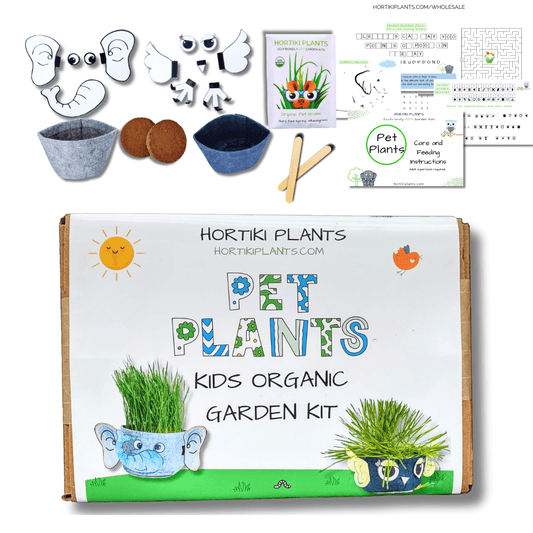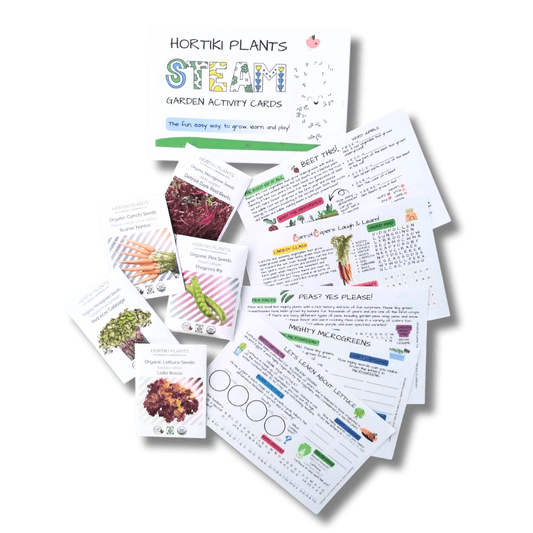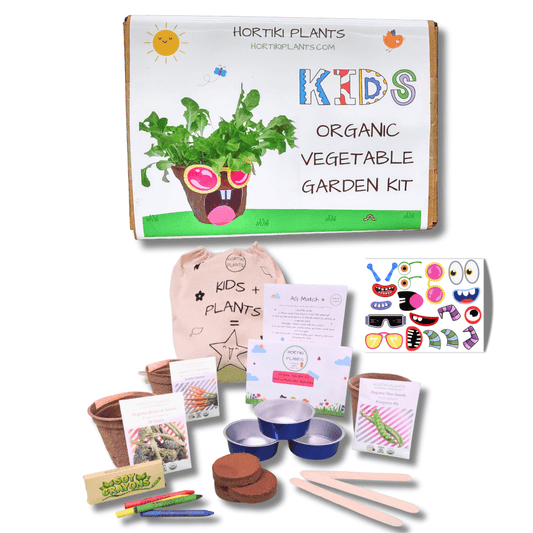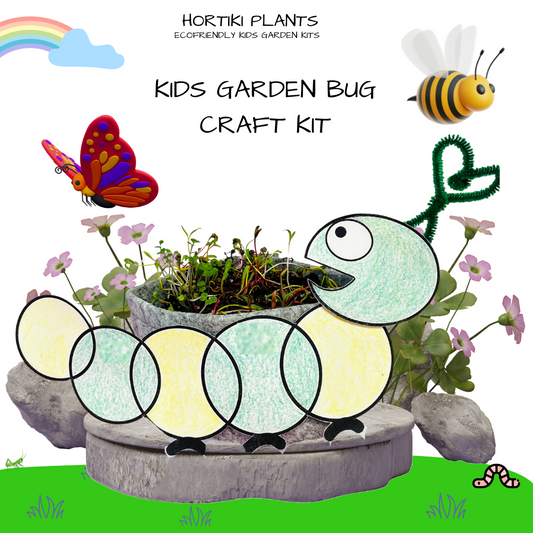Benefits of Creating a Sensory Garden
Jennifer Vazquez-Koster Hi! I’m Jen. A contributing writer for Hortiki Plants!
I love farming, gardening and all things plants and eating. I’m excited to share my passion for growing food with you, whether you are beginning your journey into the wonderful world of indoor plants, or are just looking for something new to try.
This is a great time to think about healthy habits and growing your own food is one of the most satisfying and empowering habits. Growing plants is also engaging on a deep, human level as we develop a relationship with the plants we grow. There’s so much communication that happens between plant and grower, if in the field, or our indoor plants on the windowsill. Plants engage our senses of smell and taste in unexpected ways. In this post you’ll learn the science behind how this works and the physiological benefits of creating a sensory garden in your home today!
Why Do You Smell?
The sense of smell evolved in animal cells as a way to recognize and respond to different chemicals in the environment. Have you ever walked past a rosemary bush in summer? That bright, musky scent is rosemary’s signature. And it comes from 7 different volatile compounds known to have positive effects on our health (1). The smell of rosemary invites us to try eating it! And growing plants indoors is a great way to bring some of the scents of nature into our homes.
Engage the Senses to Grow Better Herbs
Smelling herbs growing in the field is one of my favorite things to do on the farm during the summer. I love to walk through the herb plantings at the end of the day. Successions of parsley, basil, chives, and cilantro are almost always growing. If I want to learn about the plant, I can pick a leaf or two of any herb and rub the leaf between my fingers. This releases the plant’s volatile oils and it’s scent fills the air. You can do this too! Depending on how strong or subtle the scent, you can tell so many things about the plant.
By a plant’s scent, you can tell how old the plant is. Do you need to plant the next succession? You can know how much water it received. And you’ll know how it will taste, whether sweet or bitter, mild or strong. With a little practice and daily check-in, you’ll be amazed what scent can tell you about your plants.
Hot Peppers - Smell and Taste Working Together
Plants use taste and smell together too. Think of picking up a spicy pepper or spicy food and the smell that hits you - it lets you know, “Hey this is hot!”. That’s capsaicin you’re smelling! Depending on how strong the smell is, you may have a guess at how hot the pepper or food will be when you take a bite. Peppers evolved the compound capsaicin to ward off pests and other predators, and to protect it’s seeds from mold and fungal diseases while growing (2). Capsaicin has so many benefits to us - from helping with issues like arthritis and psoriasis, to lowering cholesterol and boosting metabolism (3). Too much capsaicin for our taste, however, and we may be running for a glass of water or drooling on the floor. We have a clue into what plants have more capsaicin by our sense of smell, and for better or worse, our sense of taste. Pretty amazing, right?
Why Does Basil Have So Many Different Scents?
Basil is another plant we love that has a strong scent. Check out Hortiki’s kit for growing herbs indoors here.

There’s lots of different types of basil with a range of taste and smell. Most commonly found varieties of basil, like Genovese Basil or Thai Basil, tend toward the sweet or citrusy side. Basil is part of the mint family and easily crosses with other varieties of basil. These varieties make different compounds which lead to different smells and tastes (4). Have a basil that smells citrusy? That scent comes from a compound called citral. Does your basil smell like licorice? That variety has more methyl cinnamate. All of these smells have different tastes and offer a great and easy way to add new flavors to our meals.
Scent and Health
Physiological effects of smell are also significant. Personally, I’ve come to use peppermint essential oil to ease an upset stomach, particularly when pregnant and many over-the-counter medicines are off limits. I can feel the same relief if I am lucky enough to have a peppermint plant growing nearby. Other powerful effects of plant’s smell on cognitive performance, stress, and mood have been documented (5). The scent of lavender has been shown to improve concentration and computational accuracy, increase relaxation, improve mood, and reduce stress and anxiety. Rosemary can enhance alertness and improve memory, and stimulate and improve mood. The smell of citrus has been shown to improve scholastic performance, reduce stress and anxiety, and stimulate and improve mood. The smell of cypress has even been shown to reduce blood pressure.
Scent and Memory - Green Home
Late afternoon herb walks on the farm are happy memories for me. The sense of smell has a powerful association with memory and emotion, impacting the mind and the body (6). I can pick up a bunch of parsley at the grocery store and it will always bring a smile to my face as I think of the perfect summer afternoon on the farm. Can you imagine the smell of a green wall of plants in your home? That smell is part of the health benefit that a green wall brings to your home. And a green wall is great, but a pot of oregano or arugula can have the same effect on mental health so go ahead and start small!
Positive Feedback
It is amazing how smell and taste are linked. How scent can affect our mind and body. How the smell of something indicates how it might taste, or how it may impact us physically. It’s these types of connections and communication with plants, with our food, that encourages me to continue growing. And the food you can grow keeps you healthy - from smelling them to eating them. It’s a positive feedback loop.
In today’s stressful world, it might seem far-fetched to think the smell of a plant may reduce blood pressure, or that a bitter taste is from compounds that stimulate digestion. Through our senses, we are invited to notice and engage with the natural world, to build a relationship with our plants and foods, and to keep coming back to care for and eat from our plants. Observing these changes in taste and smell is one way to enjoy our plants and can help us build those healthy habits in the New Year!
What plants are you thinking of adding to make your home a sensory garden? Let us know in the comments. We'd love to cheer you on!
Plant Love!
Jennifer Vazquez-Koster
Contributing Writer
Hortiki Plants
References:
1. Yilmazer, Mustafa, et al. “Aroma transition from rosemary leaves during aromatization of olive oil.” Journal of Food and Drug Analysis, vol. 24, issue 2, April 2016, pp 299-304, https://www.sciencedirect.com/science/article/pii/S1021949815001428#.
2. Adams, Cat. “The Complicated Evolutionary History of Spicy Chili Peppers.” Harvard University, 29 Nov 2012, https://sitn.hms.harvard.edu/flash/2012/issue131b/.
3. “Spice Up Your Life: The Health Benefits of Spicy Foods.” Penn Medicine: Health and Wellness, 01 Apr 2019, https://www.pennmedicine.org/updates/blogs/health-and-wellness/2019/april/spicy-foods
4. Andrea. ”Why Does Basil Smell Like Cat Urine, Lemon, Licorice, or Cinnamon?”. Your Indoor Herbs and Garden, https://www.yourindoorherbs.com/why-basil-smell-cat-urine-lemon-licorice-cinnamon/. 2 Jan 2022.
5. Gochman, Sam. “Scentimental Associations with Nature: Odor-Associative Learning and Biophilic Design.” The Nature Of Cities, 29 May 2016, https://www.thenatureofcities.com/2016/05/29/scentimental-associations-with-nature-odor-associative-learning-and-biophilic-design/
6. Saplakoglu, Yasemin. “Why Do Smells Trigger Memories?”. Live Science, 8 Dec 2019, https://www.livescience.com/why-smells-trigger-memories.html.




